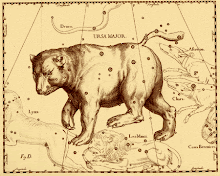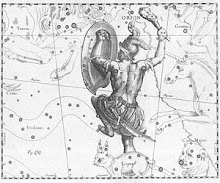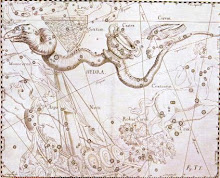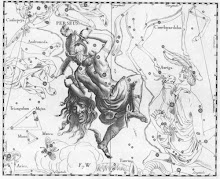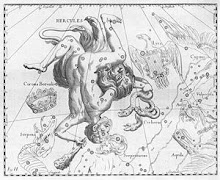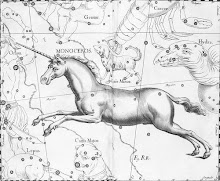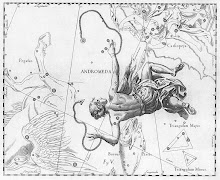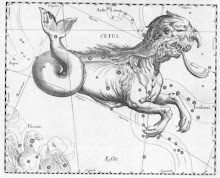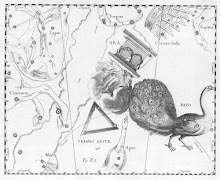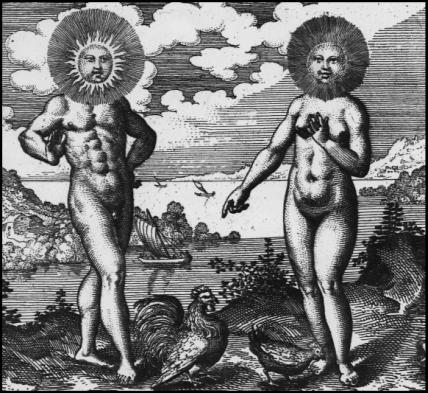YEATS Rosa Alchemica.
ROSA ALCHEMICA
William Butler Yeats
I
It is now more than ten years since I met, for the last time, Michael Robartes, and for the first time and the last time his friends and fellow students; and witnessed his and their tragic end, and endured those strange experiences, which have changed me so that my writings have grown less popular and less intelligible, and driven me almost to the verge of taking the habit of St. Dominic. I had just published Rosa Alchemica, a little work on the Alchemists, somewhat in the manner of Sir Thomas Browne, and had received many letters from believers in the arcane sciences, upbraiding what they called my timidity, for they could not believe so evident sympathy but the sympathy of the artist, which is half pity, for everything which has moved men's hearts in any age. I had discovered, early in my researches, that their doctrine was no merely chemical phantasy, but a philosophy they applied to the world, to the elements and to man himself; and that they sought to fashion gold out of common metals merely as part of an universal transmutation of all things into some divine and imperishable substance; and this enabled me to make my little book a fanciful reverie over the transmutation of life into art, and a cry of measureless desire for a world made wholly of essences.
I was sitting dreaming of what I had written, in my house in one of the old parts of Dublin; a house my ancestors had made almost famous through their part in the politics of the city and their friendships with the famous men of their generations; and was feeling an unwonted happiness at having at last accomplished a long-cherished design, and made my rooms an expression of this favourite doctrine. The portraits, of more historical than artistic interest, had gone; and tapestry, full of the blue and bronze of peacocks, fell over the doors, and shut out all history and activity untouched with beauty and peace; and now when I looked at my Crevelli and pondered on the rose in the hand of the Virgin, wherein the form was so delicate and precise that it seemed more like a thought than a flower, or at the grey dawn and rapturous faces of my Francesca, I knew all a Christian's ecstasy without his slavery to rule and custom; when I pondered over the antique bronze gods and goddesses, which I had mortgaged my house to buy, I had all a pagan's delight in various beauty and without his terror at sleepless destiny and his labour with many sacrifices; and I had only to go to my bookshelf, where every book was bound in leather, stamped with intricate ornament, and of a carefully chosen colour: Shakespeare in the orange of the glory of the world, Dante in the dull red of his anger, Milton in the blue grey of his formal calm; and I could experience what I would of human passions without their bitterness and without satiety. I had gathered about me all gods because I believed in none, and experienced every pleasure because I gave myself to none, but held myself apart, individual, indissoluble, a mirror of polished steel: I looked in the triumph of this imagination at the birds of Hera, glowing in the firelight as though they were wrought of jewels; and to my mind, for which symbolism was a necessity, they seemed the doorkeepers of my world, shutting out all that was not of as affluent a beauty as their own; and for a moment I thought as I had thought in so many other moments, that it was possible to rob life of every bitterness except the bitterness of death; and then a thought which had followed this thought, time after time, filled me with a passionate sorrow. All those forms: that Madonna with her brooding purity, those rapturous faces singing in the morning light, those bronze divinities with their passionless dignity, those wild shapes rushing from despair to despair, belonged to a divine world wherein I had no part; and every experience, however profound, every perception, however exquisite, would bring me the bitter dream of a limitless energy I could never know, and even in my most perfect moment I would be two selves, the one watching with heavy eyes the other's moment of content. I had heaped about me the gold born in the crucibles of others; but the supreme dream of the alchemist, the transmutation of the weary heart into a weariless spirit, was as far from me as, I doubted not, it had been from him also. I turned to my last purchase, a set of alchemical apparatus which, the dealer in the Rue le Peletier had assured me, once belonged to Raymond Lully, and as I joined the alembic to the athanor and laid the lavacrum maris at their side, I understood the alchemical doctrine, that all beings, divided from the great deep where spirits wander, one and yet a multitude, are weary; and sympathized, in the pride of my connoisseurship, with the consuming thirst for destruction which made the alchemist veil under his symbols of lions and dragons, of eagles and ravens, of dew and of nitre, a search for an essence which would dissolve all mortal things. I repeated to myself the ninth key of Basilius Valentinus, in which he compares the fire of the last day to the fire of the alchemist, and the world to the alchemist's furnace, and would have us know that all must be dissolved before the divine substance, material gold or immaterial ecstasy, awake. I had dissolved indeed the mortal world and lived amid immortal essences, but had obtained no miraculous ecstasy. As I thought of these things, I drew aside the curtains and looked out into the darkness, and it seemed to my troubled fancy that all those little points of light filling the sky were the furnaces of innumerable divine alchemists, who labour continually, turning lead into gold, weariness into ecstasy, bodies into souls, the darkness into God; and at their perfect labour my mortality grew heavy, and I cried out, as so many dreamers and men of letters in our age have cried, for the birth of that elaborate spiritual beauty which could alone uplift souls weighted with so many dreams.
II
My reverie was broken by a loud knocking at the door, and I wondered the more at this because I had no visitors, and had bid my servants do all things silently, lest they broke the dream of my inner life. Feeling a little curious, I resolved to go to the door myself, and, taking one of the silver candlesticks from the mantlepiece, began to descend the stairs. The servants appeared to be out, for though the sound poured through every corner and crevice of the house there was no stir in the lower rooms. I remembered that because my needs were so few, my part in life so little, they had begun to come and go as they would, often leaving me alone for hours. The emptiness and silence of a world from which I had driven everything but dreams suddenly overwhelmed me, and I shuddered as I drew the bolt. I found before me Michael Robartes, whom I had not seen for years, and whose wild red hair, fierce eyes, sensitive, tremulous lips and rough clothes, made him look now, just as they used to do fifteen years before, something between a debauchee, a saint, and a peasant. He had recently come to Ireland, he said, and wished to see me on a matter of importance: indeed, the only matter of importance for him and for me. His voice brought up before me our student years in Paris, and remembering the magnetic power he had once possessed over me, a little fear mingled with much annoyance at this irrelevant intrusion, as I led the way up the wide staircase, where Swift had passed joking and railing, and Curran telling stories and quoting Greek, in simpler days, before men's minds, subtilized and complicated by the romantic movement in art and literature, began to tremble on the verge of some unimagined revelation. I felt that my hand shook, and saw that the light of the candle wavered and quivered more than it need have upon the Maenads on the old French panels, making them look like the first beings slowly shaping in the formless and void darkness. When the door had closed, and the peacock curtain, glimmering like many-coloured flame, fell between us and the world, I felt, in a way I could not understand, that some singular and unexpected thing was about to happen. I went over to the mantlepiece, and finding that a little chainless bronze censer, set, upon the outside, with pieces of painted china by Orazio Fontana, which I had filled with antique amulets, had fallen upon its side and poured out its contents, I began to gather the amulets into the bowl, partly to collect my thoughts and partly with that habitual reverence which seemed to me the due of things so long connected with secret hopes and fears. 'I see,' said Michael Robartes, 'that you are still fond of incense, and I can show you an incense more precious than any you have ever seen,' and as he spoke he took the censer out of my hand and put the amulets in a little heap between the athanor and the alembic. I sat down, and he sat down at the side of the fire, and sat there for awhile looking into the fire, and holding the censer in his hand. 'I have come to ask you something,' he said, 'and the incense will fill the room, and our thoughts, with its sweet odour while we are talking. I got it from an old man in Syria, who said it was made from flowers, of one kind with the flowers that laid their heavy purple petals upon the hands and upon the hair and upon the feet of Christ in the Garden of Gethsemane, and folded Him in their heavy breath, until He cried against the cross and his destiny.' He shook some dust into the censer out of a small silk bag, and set the censer upon the floor and lit the dust which sent up a blue stream of smoke, that spread out over the ceiling, and flowed downwards again until it was like Milton's banyan tree. It filled me, as incense often does, with a faint sleepiness, so that I started when he said, 'I have come to ask you that question which I asked you in Paris, and which you left Paris rather than answer.'
He had turned his eyes towards me, and I saw them glitter in the firelight, and through the incense, as I replied: 'You mean, will I become an initiate of your Order of the Alchemical Rose? I would not consent in Paris, when I was full of unsatisfied desire, and now that I have at last fashioned my life according to my desire, am I likely to consent?'
'You have changed greatly since then,' he answered. 'I have read your books, and now I see you among all these images, and I understand you better than you do yourself, for I have been with many and many dreamers at the same cross-ways. You have shut away the world and gathered the gods about you, and if you do not throw yourself at their feet, you will be always full of lassitude, and of wavering purpose, for a man must forget he is miserable in the bustle and noise of the multitude in this world and in time; or seek a mystical union with the multitude who govern this world and time.' And then he murmured something I could not hear, and as though to someone I could not see.
For a moment the room appeared to darken, as it used to do when he was about to perform some singular experiment, and in the darkness the peacocks upon the doors seemed to glow with a more intense colour. I cast off the illusion, which was, I believe, merely caused by memory, and by the twilight of incense, for I would not acknowledge that he could overcome my now mature intellect; and I said: 'Even if I grant that I need a spiritual belief and some form of worship, why should I go to Eleusis and not to Calvary?' He leaned forward and began speaking with a slightly rhythmical intonation, and as he spoke I had to struggle again with the shadow, as of some older night than the night of the sun, which began to dim the light of the candles and to blot out the little gleams upon the corner of picture-frames and on the bronze divinities, and to turn the blue of the incense to a heavy purple; while it left the peacocks to glimmer and glow as though each separate colour were a living spirit. I had fallen into a profound dream-like reverie in which I heard him speaking as at a distance. 'And yet there is no one who communes with only one god,' he was saying, 'and the more a man lives in imagination and in a refined understanding, the more gods does he meet with and talk with, and the more does he come under the power of Roland, who sounded in the Valley of Roncesvalles the last trumpet of the body's will and pleasure; and of Hamlet, who saw them perishing away, and sighed; and of Faust, who looked for them up and down the world and could not find them; and under the power of all those countless divinities who have taken upon themselves spiritual bodies in the minds of the modern poets and romance writers, and under the power of the old divinities, who since the Renaissance have won everything of their ancient worship except the sacrifice of birds and fishes, the fragrance of garlands and the smoke of incense. The many think humanity made these divinities, and that it can unmake them again; but we who have seen them pass in rattling harness, and in soft robes, and heard them speak with articulate voices while we lay in deathlike trance, know that they are always making and unmaking humanity, which is indeed but the trembling of their lips.'
He had stood up and begun to walk to and fro, and had become in my waking dream a shuttle weaving an immense purple web whose folds had begun to fill the room. The room seemed to have become inexplicably silent, as though all but the web and the weaving were at an end in the world. 'They have come to us; they have come to us,' the voice began again; 'all that have ever been in your reverie, all that you have met with in books. There is Lear, his head still wet with the thunder-storm, and he laughs because you thought yourself an existence who are but a shadow, and him a shadow who is an eternal god; and there is Beatrice, with her lips half parted in a smile, as though all the stars were about to pass away in a sigh of love; and there is the mother of the God of humility who cast so great a spell over men that they have tried to unpeople their hearts that he might reign alone, but she holds in her hand the rose whose every petal is a god; and there, O swiftly she comes! is Aphrodite under a twilight falling from the wings of numberless sparrows, and about her feet are the grey and white doves.' In the midst of my dream I saw him hold out his left arm and pass his right hand over it as though he stroked the wings of doves. I made a violent effort which seemed almost to tear me in two, and said with forced determination: 'You would sweep me away into an indefinite world which fills me with terror; and yet a man is a great man just in so far as he can make his mind reflect everything with indifferent precision like a mirror.' I seemed to be perfectly master of myself, and went on, but more rapidly: 'I command you to leave me at once, for your ideas and phantasies are but the illusions that creep like maggots into civilizations when they begin to decline, and into minds when they begin to decay.' I had grown suddenly angry, and seizing the alembic from the table, was about to rise and strike him with it, when the peacocks on the door behind him appeared to grow immense; and then the alembic fell from my fingers and I was drowned in a tide of green and blue and bronze feathers, and as I struggled hopelessly I heard a distant voice saying: 'Our master Avicenna has written that all life proceeds out of corruption.' The glittering feathers had now covered me completely, and I knew that I had struggled for hundreds of years, and was conquered at last. I was sinking into the depth when the green and blue and bronze that seemed to fill the world became a sea of flame and swept me away, and as I was swirled along I heard a voice over my head cry, 'The mirror is broken in two pieces,' and another voice answer, 'The mirror is broken in four pieces,' and a more distant voice cry with an exultant cry, 'The mirror is broken into numberless pieces'; and then a multitude of pale hands were reaching towards me, and strange gentle faces bending above me, and half wailing and half caressing voices uttering words that were forgotten the moment they were spoken. I was being lifted out of the tide of flame, and felt my memories, my hopes, my thoughts, my will, everything I held to be myself, melting away; then I seemed to rise through numberless companies of beings who were, I understood, in some way more certain than thought, each wrapped in his eternal moment, in the perfect lifting of an arm, in a little circlet of rhythmical words, in dreaming with dim eyes and half-closed eyelids. And then I passed beyond these forms, which were so beautiful they had almost ceased to be, and, having endured strange moods, melancholy, as it seemed, with the weight of many worlds, I passed into that Death which is Beauty herself, and into that Loneliness which all the multitudes desire without ceasing. All things that had ever lived seemed to come and dwell in my heart, and I in theirs; and I had never again known mortality or tears, had I not suddenly fallen from the certainty of vision into the uncertainty of dream, and become a drop of molten gold falling with immense rapidity, through a night elaborate with stars, and all about me a melancholy exultant wailing. I fell and fell and fell, and then the wailing was but the wailing of the wind in the chimney, and I awoke to find myself leaning upon the table and supporting my head with my hands. I saw the alembic swaying from side to side in the distant corner it had rolled to, and Michael Robartes watching me and waiting. 'I will go wherever you will,' I said, 'and do whatever you bid me, for I have been with eternal things.' 'I knew,' he replied, 'you must need answer as you have answered, when I heard the storm begin. You must come to a great distance, for we were commanded to build our temple between the pure multitude by the waves and the impure multitude of men.'
III
I did not speak as we drove through the deserted streets, for my mind was curiously empty of familiar thoughts and experiences; it seemed to have been plucked out of the definite world and cast naked upon a shoreless sea. There were moments when the vision appeared on the point of returning, and I would half-remember, with an ecstasy of joy or sorrow, crimes and heroisms, fortunes and misfortunes; or begin to contemplate, with a sudden leaping of the heart, hopes and terrors, desires and ambitions, alien to my orderly and careful life; and then I would awake shuddering at the thought that some great imponderable being had swept through my mind. It was indeed days before this feeling passed perfectly away, and even now, when I have sought refuge in the only definite faith, I feel a great tolerance for those people with incoherent personalities, who gather in the chapels and meeting-places of certain obscure sects, because I also have felt fixed habits and principles dissolving before a power, which was hysterica passio or sheer madness, if you will, but was so powerful in its melancholy exultation that I tremble lest it wake again and drive me from my new-found peace.
When we came in the grey light to the great half-empty terminus, it seemed to me I was so changed that I was no more, as man is, a moment shuddering at eternity, but eternity weeping and laughing over a moment; and when we had started and Michael Robartes had fallen asleep, as he soon did, his sleeping face, in which there was no sign of all that had so shaken me and that now kept me wakeful, was to my excited mind more like a mask than a face. The fancy possessed me that the man behind it had dissolved away like salt in water, and that it laughed and sighed, appealed and denounced at the bidding of beings greater or less than man. 'This is not Michael Robartes at all: Michael Robartes is dead; dead for ten, for twenty years perhaps,' I kept repeating to myself. I fell at last into a feverish sleep, waking up from time to time when we rushed past some little town, its slated roofs shining with wet, or still lake gleaming in the cold morning light. I had been too pre-occupied to ask where we were going, or to notice what tickets Michael Robartes had taken, but I knew now from the direction of the sun that we were going westward; and presently I knew also, by the way in which the trees had grown into the semblance of tattered beggars flying with bent heads towards the east, that we were approaching the western coast. Then immediately I saw the sea between the low hills upon the left, its dull grey broken into white patches and lines.
When we left the train we had still, I found, some way to go, and set out, buttoning our coats about us, for the wind was bitter and violent. Michael Robartes was silent, seeming anxious to leave me to my thoughts; and as we walked between the sea and the rocky side of a great promontory, I realized with a new perfection what a shock had been given to all my habits of thought and of feelings, if indeed some mysterious change had not taken place in the substance of my mind, for the grey waves, plumed with scudding foam, had grown part of a teeming, fantastic inner life; and when Michael Robartes pointed to a square ancient-looking house, with a much smaller and newer building under its lee, set out on the very end of a dilapidated and almost deserted pier, and said it was the Temple of the Alchemical Rose, I was possessed with the phantasy that the sea, which kept covering it with showers of white foam, was claiming it as part of some indefinite and passionate life, which had begun to war upon our orderly and careful days, and was about to plunge the world into a night as obscure as that which followed the downfall of the classical world. One part of my mind mocked this phantastic terror, but the other, the part that still lay half plunged in vision, listened to the clash of unknown armies, and shuddered at unimaginable fanaticisms, that hung in those grey leaping waves.
We had gone but a few paces along the pier when we came upon an old man, who was evidently a watchman, for he sat in an overset barrel, close to a place where masons had been lately working upon a break in the pier, and had in front of him a fire such as one sees slung under tinkers' carts. I saw that he was also a voteen, as the peasants say, for there was a rosary hanging from a nail on the rim of the barrel, and I saw I shuddered, and I did not know why I shuddered. We had passed him a few yards when I heard him cry in Gaelic, 'Idolaters, idolaters, go down to Hell with your witches and your devils; go down to Hell that the herrings may come again into the bay'; and for some moments I could hear him half screaming and half muttering behind us. 'Are you not afraid,' I said, 'that these wild fishing people may do some desperate thing against you?'
'I and mine,' he answered, 'are long past human hurt or help, being incorporate with immortal spirits, and when we die it shall be the consummation of the supreme work. A time will come for these people also, and they will sacrifice a mullet to Artemis, or some other fish to some new divinity, unless indeed their own divinities, the Dagda, with his overflowing cauldron, Lug, with his spear dipped in poppy-juice lest it rush forth hot for battle. Aengus, with the three birds on his shoulder, Bodb and his red swineherd, and all the heroic children of Dana, set up once more their temples of grey stone. Their reign has never ceased, but only waned in power a little, for the Sidhe still pass in every wind, and dance and play at hurley, and fight their sudden battles in every hollow and on every hill; but they cannot build their temples again till there have been martyrdoms and victories, and perhaps even that long-foretold battle in the Valley of the Black Pig.'
Keeping close to the wall that went about the pier on the seaward side, to escape the driving foam and the wind, which threatened every moment to lift us off our feet, we made our way in silence to the door of the square building. Michael Robartes opened it with a key, on which I saw the rust of many salt winds, and led me along a bare passage and up an uncarpeted stair to a little room surrounded with bookshelves. A meal would be brought, but only of fruit, for I must submit to a tempered fast before the ceremony, he explained, and with it a book on the doctrine and method of the Order, over which I was to spend what remained of the winter daylight. He then left me, promising to return an hour before the ceremony. I began searching among the bookshelves, and found one of the most exhaustive alchemical libraries I have ever seen. There were the works of Morienus, who hid his immortal body under a shirt of hair-cloth; of Avicenna, who was a drunkard and yet controlled numberless legions of spirits; of Alfarabi, who put so many spirits into his lute that he could make men laugh, or weep, or fall in deadly trance as he would; of Lully, who transformed himself into the likeness of a red cock; of Flamel, who with his wife Parnella achieved the elixir many hundreds of years ago, and is fabled to live still in Arabia among the Dervishes; and of many of less fame. There were very few mystics but alchemical mystics, and because, I had little doubt, of the devotion to one god of the greater number and of the limited sense of beauty, which Robartes would hold an inevitable consequence; but I did notice a complete set of facsimiles of the prophetical writings of William Blake, and probably because of the multitudes that thronged his illumination and were 'like the gay fishes on the wave when the moon sucks up the dew.' I noted also many poets and prose writers of every age, but only those who were a little weary of life, as indeed the greatest have been everywhere, and who cast their imagination to us, as a something they needed no longer now that they were going up in their fiery chariots.
Presently I heard a tap at the door, and a woman came in and laid a little fruit upon the table. I judged that she had once been handsome, but her cheeks were hollowed by what I would have held, had I seen her anywhere else, an excitement of the flesh and a thirst for pleasure, instead of which it doubtless was an excitement of the imagination and a thirst for beauty. I asked her some question concerning the ceremony, but getting no answer except a shake of the head, saw that I must await initiation in silence. When I had eaten, she came again, and having laid a curiously wrought bronze box on the table, lighted the candles, and took away the plates and the remnants. So soon as I was alone, I turned to the box, and found that the peacocks of Hera spread out their tails over the sides and lid, against a background, on which were wrought great stars, as though to affirm that the heavens were a part of their glory. In the box was a book bound in vellum, and having upon the vellum and in very delicate colours, and in gold, the alchemical rose with many spears thrusting against it, but in vain, as was shown by the shattered points of those nearest to the petals. The book was written upon vellum, and in beautiful clear letters, interspersed with symbolical pictures and illuminations, after the manner of the Splendor Solis.
The first chapter described how six students, of Celtic descent, gave themselves separately to the study of alchemy, and solved, one the mystery of the Pelican, another the mystery of the green Dragon, another the mystery of the Eagle, another that of Salt and Mercury. What seemed a succession of accidents, but was, the book declared, the contrivance of preternatural powers, brought them together in the garden of an inn in the South of France, and while they talked together the thought came to them that alchemy was the gradual distillation of the contents of the soul, until they were ready to put off the mortal and put on the immortal. An owl passed, rustling among the vine-leaves overhead, and then an old woman came, leaning upon a stick, and, sitting close to them, took up the thought where they had dropped it. Having expounded the whole principle of spiritual alchemy, and bid them found the Order of the Alchemical Rose, she passed from among them, and when they would have followed she was nowhere to be seen. They formed themselves into an Order, holding their goods and making their researches in common, and, as they became perfect in the alchemical doctrine, apparitions came and went among them, and taught them more and more marvellous mysteries. The book then went on to expound so much of these as the neophyte was permitted to know, dealing at the outset and at considerable length with the independent reality of our thoughts, which was, it declared, the doctrine from which all true doctrines rose. If you imagine, it said, the semblance of a living being, it is at once possessed by a wandering soul, and goes hither and thither working good or evil, until the moment of its death has come; and gave many examples, received, it said, from many gods. Eros had taught them how to fashion forms in which a divine soul could dwell, and whisper what they would into sleeping minds; and Ate, forms from which demonic beings could pour madness, or unquiet dreams, into sleeping blood; and Hermes, that if you powerfully imagined a hound at your bedside it would keep watch there until you woke, and drive away all but the mightiest demons, but that if your imagination was weakly, the hound would be weakly also, and the demons prevail, and the hound soon die; and Aphrodite, that if you made, by a strong imagining, a dove crowned with silver and had it flutter over your head, its soft cooing would make sweet dreams of immortal love gather and brood over mortal sleep; and all divinities alike had revealed with many warnings and lamentations that all minds are continually giving birth to such beings, and sending them forth to work health or disease, joy or madness. If you would give forms to the evil powers, it went on, you were to make them ugly, thrusting out a lip, with the thirsts of life, or breaking the proportions of a body with the burdens of life; but the divine powers would only appear in beautiful shapes, which are but, as it were, shapes trembling out of existence, folding up into a timeless ecstasy, drifting with half-shut eyes, into a sleepy stillness. The bodiless souls who descended into these forms were what men called the moods; and worked all great changes in the world; for just as the magician or the artist could call them when he would, so they could call out of the mind of the magician or the artist, or if they were demons, out of the mind of the mad or the ignoble, what shape they would, and through its voice and its gestures pour themselves out upon the world. In this way all great events were accomplished; a mood, a divinity, or a demon, first descending like a faint sigh into men's minds and then changing their thoughts and their actions until hair that was yellow had grown black, or hair that was black had grown yellow, and empires moved their border, as though they were but drifts of leaves. The rest of the book contained symbols of form, and sound, and colour, and their attribution to divinities and demons, so that the initiate might fashion a shape for any divinity or any demon, and be as powerful as Avicenna among those who live under the roots of tears and of laughter.
IV
A couple of hours after Sunset Michael Robartes returned and told me that I would have to learn the steps of an exceedingly antique dance, because before my initiation could be perfected I had to join three times in a magical dance, for rhythm was the wheel of Eternity, on which alone the transient and accidental could be broken, and the spirit set free. I found that the steps, which were simple enough, resembled certain antique Greek dances, and having been a good dancer in my youth and the master of many curious Gaelic steps, I soon had them in my memory. He then robed me and himself in a costume which suggested by its shape both Greece and Egypt, but by its crimson colour a more passionate life than theirs; and having put into my hands a little chainless censer of bronze, wrought into the likeness of a rose, by some modern craftsman, he told me to open a small door opposite to the door by which I had entered. I put my hand to the handle, but the moment I did so the fumes of the incense, helped perhaps by his mysterious glamour, made me fall again into a dream, in which I seemed to be a mask, lying on the counter of a little Eastern shop. Many persons, with eyes so bright and still that I knew them for more than human, came in and tried me on their faces, but at last flung me into a corner with a little laughter; but all this passed in a moment, for when I awoke my hand was still upon the handle. I opened the door, and found myself in a marvellous passage, along whose sides were many divinities wrought in a mosaic, not less beautiful than the mosaic in the Baptistery at Ravenna, but of a less severe beauty; the predominant colour of each divinity, which was surely a symbolic colour, being repeated in the lamps that hung from the ceiling, a curiously-scented lamp before every divinity. I passed on, marvelling exceedingly how these enthusiasts could have created all this beauty in so remote a place, and half persuaded to believe in a material alchemy, by the sight of so much hidden wealth; the censer filling the air, as I passed, with smoke of ever-changing colour.
I stopped before a door, on whose bronze panels were wrought great waves in whose shadow were faint suggestions of terrible faces. Those beyond it seemed to have heard our steps, for a voice cried: 'Is the work of the Incorruptible Fire at an end?' and immediately Michael Robartes answered: 'The perfect gold has come from the athanor.' The door swung open, and we were in a great circular room, and among men and women who were dancing slowly in crimson robes. Upon the ceiling was an immense rose wrought in mosaic; and about the walls, also in mosaic, was a battle of gods and angels, the gods glimmering like rubies and sapphires, and the angels of the one greyness, because, as Michael Robartes whispered, they had renounced their divinity, and turned from the unfolding of their separate hearts, out of love for a God of humility and sorrow. Pillars supported the roof and made a kind of circular cloister, each pillar being a column of confused shapes, divinities, it seemed, of the wind, who rose as in a whirling dance of more than human vehemence, and playing upon pipes and cymbals; and from among these shapes were thrust out hands, and in these hands were censers. I was bid place my censer also in a hand and take my place and dance, and as I turned from the pillars towards the dancers, I saw that the floor was of a green stone, and that a pale Christ on a pale cross was wrought in the midst. I asked Robartes the meaning of this, and was told that they desired 'To trouble His unity with their multitudinous feet.' The dance wound in and out, tracing upon the floor the shapes of petals that copied the petals in the rose overhead, and to the sound of hidden instruments which were perhaps of an antique pattern, for I have never heard the like; and every moment the dance was more passionate, until all the winds of the world seemed to have awakened under our feet. After a little I had grown weary, and stood under a pillar watching the coming and going of those flame-like figures; until gradually I sank into a half-dream, from which I was awakened by seeing the petals of the great rose, which had no longer the look of mosaic, falling slowly through the incense-heavy air, and, as they fell, shaping into the likeness of living beings of an extraordinary beauty. Still faint and cloud-like, they began to dance, and as they danced took a more and more definite shape, so that I was able to distinguish beautiful Grecian faces and august Egyptian faces, and now and again to name a divinity by the staff in his hand or by a bird fluttering over his head; and soon every mortal foot danced by the white foot of an immortal; and in the troubled eyes that looked into untroubled shadowy eyes, I saw the brightness of uttermost desire as though they had found at length, after unreckonable wandering, the lost love of their youth. Sometimes, but only for a moment, I saw a faint solitary figure with a Rosa veiled face, and carrying a faint torch, flit among the dancers, but like a dream within a dream, like a shadow of a shadow, and I knew by an understanding born from a deeper fountain than thought, that it was Eros himself, and that his face was veiled because no man or woman from the beginning of the world has ever known what love is, or looked into his eyes, for Eros alone of divinities is altogether a spirit, and hides in passions not of his essence if he would commune with a mortal heart. So that if a man love nobly he knows love through infinite pity, unspeakable trust, unending sympathy; and if ignobly through vehement jealousy, sudden hatred, and unappeasable desire; but unveiled love he never knows. While I thought these things, a voice cried to me from the crimson figures: 'Into the dance! there is none that can be spared out of the dance; into the dance! into the dance! that the gods may make them bodies out of the substance of our hearts'; and before I could answer, a mysterious wave of passion, that seemed like the soul of the dance moving within our souls, Alchemica took hold of me, and I was swept, neither consenting nor refusing, into the midst. I was dancing with an immortal august woman, who had black lilies in her hair, and her dreamy gesture seemed laden with a wisdom more profound than the darkness that is between star and star, and with a love like the love that breathed upon the waters; and as we danced on and on, the incense drifted over us and round us, covering us away as in the heart of the world, and ages seemed to pass, and tempests to awake and perish in the folds of our robes and in her heavy hair.
Suddenly I remembered that her eyelids had never quivered, and that her lilies had not dropped a black petal, or shaken from their places, and understood with a great horror that I danced with one who was more or less than human, and who was drinking up my soul as an ox drinks up a wayside pool; and I fell, and darkness passed over me.
V
I awoke suddenly as though something had awakened me, and saw that I was lying on a roughly painted floor, and that on the ceiling, which was at no great distance, was a roughly painted rose, and about me on the walls half-finished paintings. The pillars and the censers had gone; and near me a score of sleepers lay wrapped in disordered robes, their upturned faces looking to my imagination like hollow masks; and a chill dawn was shining down upon them from a long window I had not noticed before; and outside the sea roared. I saw Michael Robartes lying at a little distance and beside him an overset bowl of wrought bronze which looked as though it had once held incense. As I sat thus, I heard a sudden tumult of angry men and women's voices mix with the roaring of the sea; and leaping to my feet, I went quickly to Michael Robartes, and tried to shake him out of his sleep. I then seized him by the shoulder and tried to lift him, but he fell backwards, and sighed faintly; and the voices became louder and angrier; and there was a sound of heavy blows upon the door, which opened on to the pier. Suddenly I heard a sound of rending wood, and I knew it had begun to give, and I ran to the door of the room. I pushed it open and came out upon a passage whose bare boards clattered under my feet, and found in the passage another door which led into an empty kitchen; and as I passed through the door I heard two crashes in quick succession, and knew by the sudden noise of feet and the shouts that the door which opened on to the pier had fallen inwards. I ran from the kitchen and out into a small yard, and from this down some steps which descended the seaward and sloping side of the pier, and from the steps clambered along the water's edge, with the angry voices ringing in my ears. This part of the pier had been but lately refaced with blocks of granite, so that it was almost clear of seaweed; but when I came to the old part, I found it so slippery with green weed that I had to climb up on to the roadway. I looked towards the Temple of the Alchemical Rose, where the fishermen and the women were still shouting, but somewhat more faintly, and saw that there was no one about the door or upon the pier; but as I looked, a little crowd hurried out of the door and began gathering large stones from where they were heaped up in readiness for the next time a storm shattered the pier, when they would be laid under blocks of granite. While I stood watching the crowd, an old man, who was, I think, the voteen, pointed to me, and screamed out something, and the crowd whitened, for all the faces had turned towards me. I ran, and it was well for me that pullers of the oar are poorer men with their feet than with their arms and their bodies; and yet while I ran I scarcely heard the following feet or the angry voices, for many voices of exultation and lamentation, which were forgotten as a dream is forgotten the moment they were heard, seemed to be ringing in the air over my head.
There are moments even now when I seem to hear those voices of exultation and lamentation, and when the indefinite world, which has but half lost its mastery over my heart and my intellect, seems about to claim a perfect mastery; but I carry the rosary about my neck, and when I hear, or seem to hear them, I press it to my heart and say: 'He whose name is Legion is at our doors deceiving our intellects with subtlety and flattering our hearts with beauty, and we have no trust but in Thee'; and then the war that rages within me at other times is still, and I am at peace.
LA LÉGENDE D'HIRAM
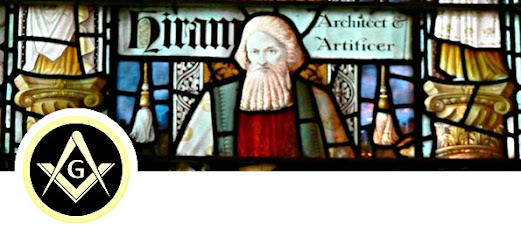
Articles les plus récents
LES SENTIERS D’HERMÈS







































